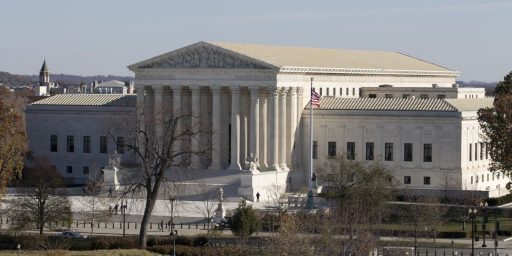Tax Overhaul Commission Reports
A presidential commission appointed to recommend revisions to the tax code is presenting its findings today. The early evidence suggests they will be controversial.
Panel to Recommend Tax Overhaul Designs (AP)
Chosen to find a simpler way to tax the nation, a presidential panel gets set to recommend two designs that would rewrite virtually every tax law for individuals and businesses. Under the plan, most deductions, credits and other tax breaks would be eliminated along with much of the paperwork and equations that baffle taxpayers under a drastically simplified income tax. But many have wondered whether the key recommendations may be too unpopular to ever be enacted by Congress.
The nine members of the presidential commission present their findings Tuesday to Treasury Secretary John Snow, who told the Detroit Economic Club on Monday the nation’s taxes need “not only theoretical reform, not only academic reform, but actual practical reform.” The President’s Advisory Panel on Federal Tax Reform spent most of the year studying tax designs, including consumption taxes like a national retail sales tax. President Bush tasked the group with finding simpler and more economically productive ideas for taxation. The commission wrapped up its work last month, and its ideas immediately attracted criticism — some from those wanted to see more change and some from those who felt the changes went too far.
Under both of the panel’s alternatives, three out of four taxpayers would fall into the lowest, 15 percent, tax bracket. Under one plan, individuals would pay no tax on dividends paid by U.S. companies and exclude 75 percent of their capital gains from taxation. Under the second plan, all investment income would be taxed at 15 percent. Both proposals would abolish the alternative minimum tax, a levy originally drafted to prevent wealthy individuals from escaping taxation but increasingly reaching into the middle class. They also would eliminate federal deductions and credits for mortgage interest, state and local taxes and education, among others. The advisory commission would replace those withdrawn tax breaks with simpler benefits, including three savings plans that supplant dozens currently available for retirement, medical expenses and education.
Bush set certain limits on the panel, requiring that the new plans collect as much tax money as the government collects now. The proposals also had to retain the progressive system that taxes wealthier taxpayers at higher rates than poorer individuals and families. They were also required to recognize “the importance of homeownership and charity in American society.”
The panel rejected frequently touted ideas to impose taxes on consumption, like a retail sales tax.
I’ll reserve comment on the plans until I see more details. As described here, though, it would seem a big improvement over the current system, which evolved into a complicated mess over the years.
Paying taxes is a necessary evil. It should, however, be as painless as possible. A system that requires ordinary citizens to keep detailed records and either hire an accountant or take their chances navigating the system alone is prima facie too complicated.





